It's been seven years since I last drove the Trans-Canada Highway from Halifax to Cape Breton. Back then I cruised the Cabot Trail, stopping at destinations such as Ingonish and Cheticamp to take in everything – Cape Breton Highlands National Park, a ceilidh or two and buckets of snow crab – that makes touring the picturesque circuit one of Canada's most charming East Coast getaways for over 300,000 travellers every year.
On a rainy day this past June, I found myself back in Nova Scotia, where the rugged landscape was just as breathtaking as I remembered it. But instead of steering an economy rental towards a Baddeck bed-and-breakfast, I was being chauffeured in a Mercedes Sprinter van to Inverness's luxurious Cabot Links golf resort.
A former mining town whose population began declining in the 1950s with the closing of its coal mines, Inverness has evolved into a top getaway for the golf set. Tales of deep-pocketed tourists flying in for a round on their private jets (and a quaint main drag that seems poised to fill up with chic boutiques) fuel ongoing speculation that Inverness is on the cusp of becoming a world-class luxury destination, known as much for its high-end shopping, dining and designer villas as its acres of manicured fairways. Inverness could, some say, become Canada's Hamptons.
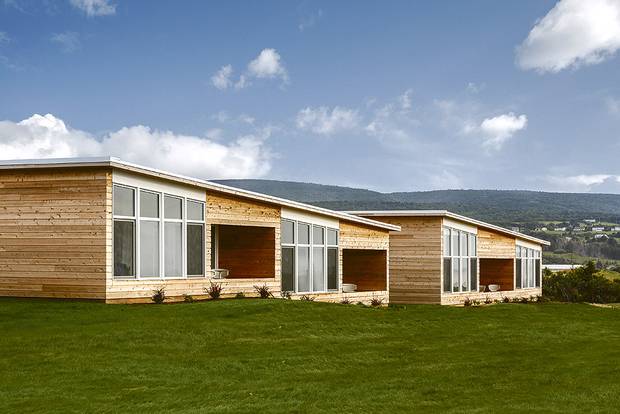
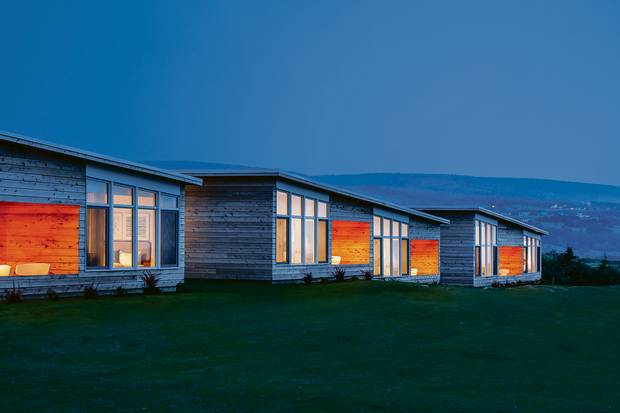
Luxurious villas by rising Canadian architecture star Omar Gandhi are one way Inverness and its Cabot Links resort are differentiating themselves from other Nova Scotian communities.
Heather Marrin
"Building a golf course in the middle of nowhere, you hope that at least a couple of people come," says founder Ben Cowan-Dewar, who was 33 when Cabot Links opened in 2012, financed with the help of his business partner, American golf entrepreneur Mike Keiser. Since then, 75,000 guests have teed-off over the past four seasons and the Cabot Links course landed at number 42 on Golf Digest's World's 100 Greatest Golf Courses list in 2014 (its offshoot Cabot Cliffs, which launched in June, landed at number 19 on this year's list, thanks to a short preview period last summer). "Now that we have two courses and are seeing traffic, there's lots of growth to think about," he says.
Those expansion plans include a lineup of new villas, which were sold for over a million dollars each and entered into a rental pool that splits profits between Cabot Links and the owners. Designed by Halifax-based Omar Gandhi, winner of the Canada Council's Prix de Rome in Architecture in 2014, they feature folding glass walls that lead onto a private deck with views of Cabot Links's first hole and the Atlantic ocean beyond.
"People are looking to stay in a place where they have a level of luxury and a lot of the bells and whistles, but access to an environment that feels natural," says general manager Andrew Alkenbrack, who is a childhood friend of Cowan-Dewar, arriving at Cabot Links after a two-year stint as acting general manager at the international luxury hotel group Aman Resorts.
The villas, which start at $600 a night (the hotel's rooms go for $180 and up), feature L'Occitane-stocked bathrooms with heated floors, king-sized beds and Thermador appliances. "Luxury has many meanings to many people," says Cowan-Dewar. "In the last 20 years, travel has skewed that way – people's expectations of food and lodgings are higher – and to draw people from the U.S. and Canada, we were focused on that from an early point." Cabot Link's gourmet restaurant, Panorama, was expanded by 60 seats over the winter and plans for a spa are on the horizon.
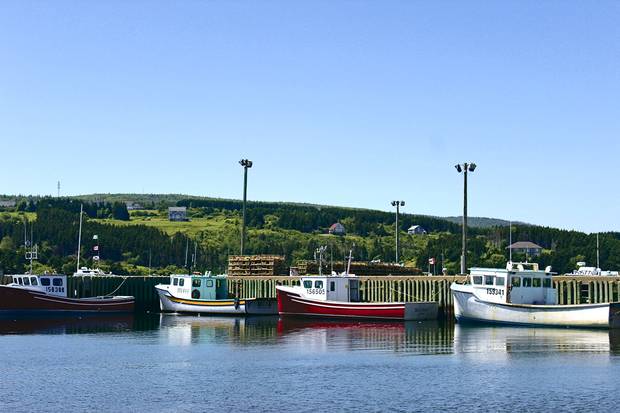
Quaint East Coast cool.
Heather Marrin
The growing number of accommodations highlights the increased tourism Cabot Links is bringing to the area, says Mary Tulle, CEO of the local tourism board, Destination Cape Breton. "That's 65 new rooms, as well as the suites and condos. Plus there's growth in the properties surrounding Inverness. And Cabot is running at 97 per cent occupancy – those are numbers that didn't exist four years ago." Destination Cape Breton's affiliate company, Golf Cape Breton, a "white-glove" golf concierge service that books everything from tee times to entertainment, made $70,000 in bookings when it launched in 2013 and, this year, is on track to hit over $400,000.
An increase in tourism has many benefits, but what do the neighbours think about their town's new cachet? Some long-time residents of Long Island complain when an old potato farm gets scooped up and developed into a Hamptons-style mansion, but officials in Inverness are eager to embrace the town's new sense of luxe.
"We knew this was going to take some time," says Duart MacAulay, the warden for District 4 in the Municipality of the County of Inverness. "We have seen a substantial increase in building permits and building revenues and it's all golf-course related. There are some really nice private homes being built in the vicinity of Inverness and outside the community." (One currently under construction and garnering attention is owned by American real-estate developer Roland W. Betts.)
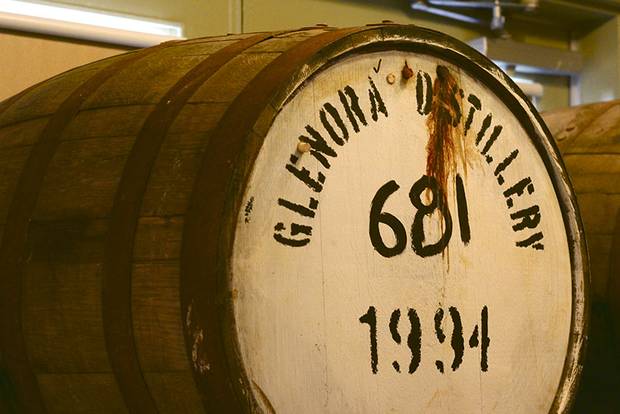
The nearby Glenora Distillery.
Heather Marrin
The increase in private construction of summer homes and permanent residences was made possible when the town extended its water lines outside the community. The extra development revenue has allowed the funding of sidewalk upgrades in surrounding areas. "We are making the whole municipality a better place for our residents," says MacAulay, "and the golf course is allowing us to move more quickly."
"We're quite proud of the management team over there at Cabot," he adds. "They're very community-conscientious people and most of them walk down the street now and people know them by their first names." Alkenbrack's collegial manner is evident when he greets everyone with the same smile and enthusiasm on a visit to the Village Market – a weekly craft fair where local makers sell everything from crocheted mitts, to jewellery made from sea glass.
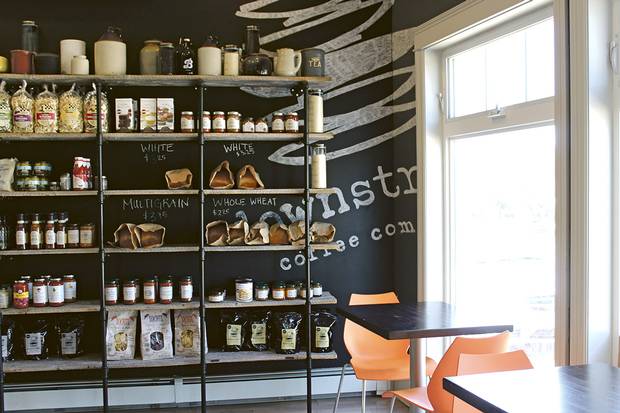
Downstreet Coffee Company and its selection of indie skin care and gourmet foodstuffs.
Heather Marrin
The most dynamic spot on Inverness's main drag is the Downstreet Coffee Company, which is owned by Cabot Links but situated a few blocks south of the resort on Central Avenue. Once a bank and clothing store, it now serves cappuccinos and fresh breakfasts, and doubles as a gift shop; indie skin-care products and gourmet food items are displayed in the old vault. This one space fits Inverness's new identity well, but, so far, it feels like the small-business potential of its main street hasn't been maximized.

The centre of town is likely to transform in step with the elevated taste of its tourists and residents over the next few years, charming old storefronts filling up with boutique hotels, day spas and carefully curated clothing stores. At the soft sand beach a five-minute walk away, overlooking what's often heralded as the warmest waters north of the Carolinas, an ice-cream parlour selling cool local housewares and handcrafts would also fit the new Inverness to a tee.
Alex Laws travelled to Cape Breton as a guest of Cabot Links. The company did not review or approve this article prior to publication.